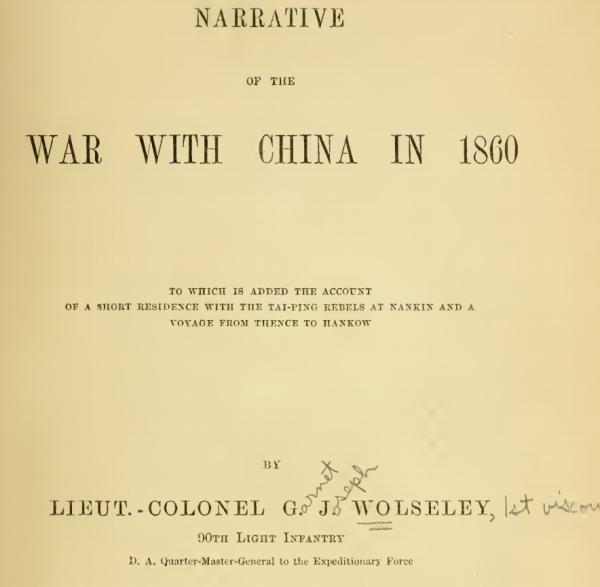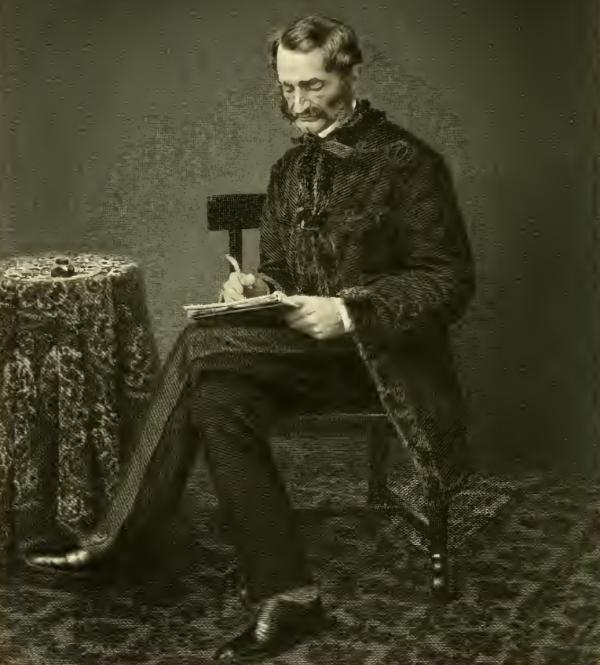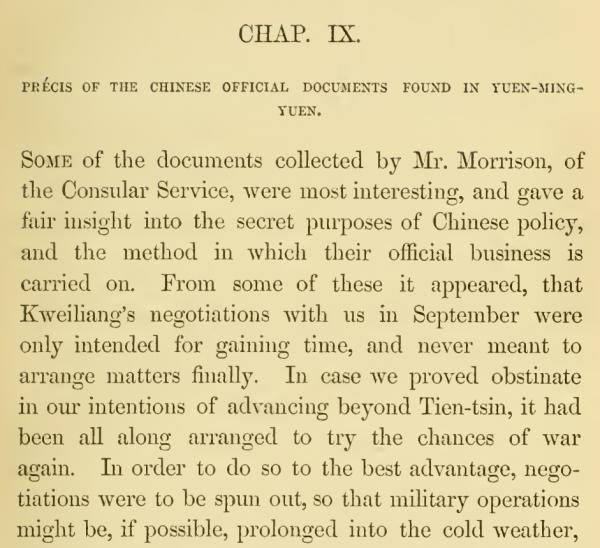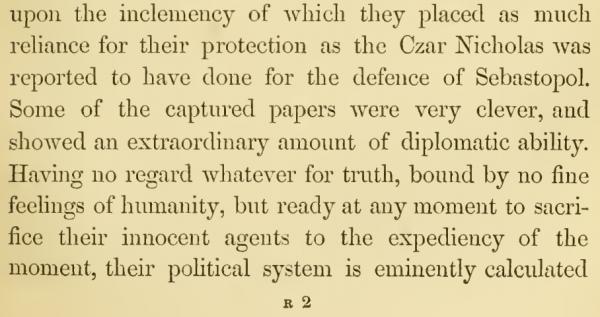| 咸丰秘档竟闪动着刘总理习主席智慧光芒 |
| 送交者: Pascal 2019年02月15日12:27:49 于 [五 味 斋] 发送悄悄话 |
|
159年前 —— 1860年10月 英法联军进入圆明园 在园内大清中央 领导核心咸丰同志密室里 发现一批绝密档案 ( 由 Sir Thomas Francis Wade 韦德先生译成英文 ) 字里行间竟然闪动着刘总理 (副,排行老四)习主席(这位爷)博大精深智慧的 耀 眼 光 芒
作者:1860年中英第二次战争中 英军陆军司令詹姆斯·霍普·格兰特 James Hope Grant 参谋部 后勤主管 deputy-assistant quartermaster-general 时年27岁中校 Lieutenant colonel 第一代子爵 嘉内德·约瑟夫·沃尔斯利 Garnet Joseph Wolseley, 1st Viscount Wolseley;1894年5月26日, 晋升为陆军元帅 Field Marshal
升级版谷歌同学一秒钟完工译文: 圆明园发现中国官方文献概述。莫里森先生收集的一些文件 领事处是最有趣的,并给了一个 公正洞察中国政策的秘密目的, 以及进行公务的方法。从其中一些出现,那 Kweiliang九月与我们的谈判是 只是为了获得时间,而且从来没有打算最终安排事情。如果我们证明顽固 在我们超越天津的意图中,它有了 一直都在安排尝试战争的机会 再次。为了最大限度地做到这一点,谈判被分拆出来,以便进行军事行动 如果可能的话,可能会延长到寒冷的天气, 在他们放置的宽容之后 像沙皇尼古拉斯那样依赖他们的保护 据报道,他们为塞巴斯托波尔的防卫工作做了贡献。 一些被捕获的论文非常聪明,而且 表现出非凡的外交能力。 不顾真理,不受任何罚款 人性的感情,但随时准备牺牲自己的无辜代理人的权宜之计 那一刻,他们的政治制度是非常重要的 for all the complex situations of diplomacy. The coldblooded rules for government enunciated in " The Prince," appear to be well understood in China. His Celestial Majesty can never do wrong ; not because his actions are always guided by a council responsible to the people, but that in the event of any failure on the part of a public servant deputed for any special duty, even though such may have arisen from a strict adherence to his orders, all responsibility is cast upon the unsuccessful agent, who is publicly degraded, to impress the people with an idea that the whole con- duct of the affair had been initiated by him. Gratitude for faithful services is never permitted to interfere with the exigencies of the moment. Expediency to its most extended limit is the one great law regulating the official dealings of his Majesty, both with his own people and foreigners. So in one of these papers we find the draft of an Imperial decree directing Kweiliang to be degraded as soon as the mock negotiations, in which he was engaged at Tien-tsin, came to an end. It was no doubt expected that the publication of that order would lead us to believe that he alone was to blame for the non-arrangement of affairs, and incline us to lend a more willing ear —as we subsequently did —to the proposals made by his successor. Success covers all errors in most governments ; but in China we find one of the highest and most faithful public ser- vants deprived of rank and station for carrying out accurately the instructions he had received, in order to give to mock negotiations the semblance of reality. A long paper, written with the vermilion pencil of royalty, upon the subject of our demands, gives a fair outline of the various degrees of importance attached by Chinese politicians to each of the specific concessions we had asked for. Of all others, they considered the march of troops into Pekin as the most highly objectionable, and the residence of an ambassador there as next in importance, both equally to be avoided. The paper went on to say,—"If conciliation is once negotiated, why do they want to bring soldiers to Pekin with their ambassadors? Their doing so would seem that they had some hidden purpose, which, when their troops were within Pekin, it would be as impossible to concede as it would then be to fight."—" Were we to assent, would there be any more word of that most important of all places, the capital?" On the subject of war expenses, his Majesty said, " Setting aside the impossibility of paying the two millions of taels by the time named, it is utterly out of the question to pay at all."—" From of old, it has been held a disgrace to make treaties under your city walls, and if one is again to tender gifts, whilst one's face is ashamed, will China be thought still to have a man ? " This head was to be disposed of by applying to us for monied indemnification for the expenses which the war had entailed upon the Imperial Government. As to the admission of Mr. Parkes within Pekin, his Majesty considered that if once conceded, that gentleman, " idly yelping and frantically barking, is certain to bring forward other conditions," and might not be subsequently got rid of easily. The memorial of Sang-ko-lin-sin, dated the 26th August, two days after the fall of the Takoo forts, addressed to the Emperor, was one, which, from many other papers found and translated by Mr. Wade, seems to have created great sensation amongst all the Imperial ministers, and to have been condemned most strongly by every official whom we know to have written to his Majesty regarding it. The subject of the memorial was advising Hien-fung to start on a hunting tour ; the reasons he urges for the necessity of such a move seem so inconclusive and so thoroughly untenable before the great weight of argument brought to bear against them, that the advice appears interested, and carries with it a certain amount of what might be intended treachery. So unanimous are all the civil ministers in their condemnation of such a proceeding, that it would almost seem that they suspected some ulterior motives on Sang-ko-lin-sin's part. From all previously found documents emanating from his pen, and from his general reputation, there cannot be any doubt regarding his mental ability and ordinarily sound views upon military matters and public business in general. He made a great mistake certainly in not fortifying Pehtang as strongly as he had fortified Takoo, but this to a certain extent may have arisen from want of men and means ; but in the paper which he drew up regarding the general defences of the coast-line, and the chances of their being successfully attacked by the barbarians — to which I have previously referred —his views were most able, and the opinions therein set forth of the certainty of our complete overthrow and failure, were based most fairly upon military grounds, and would have been given under similar circumstances by any man who was ignorant of our superiority in guns and discipline. Knowing the great strength of his position, he was naturally confident of victory. He had a very large force of cavalry —an arm which he fancied it to be impossible we should be furnished with; he had numbers of guns in position, to which, in the general Chinese ignorance regarding field artillery, he thought we should be able to reply only with small arms. With such data before him, surely it is not surprising that he should be confident of success! Indeed, so powerful and ample must his resources have appeared to him, that it was no wonder he regarded our being able to effect a landing at Peh-tang as rather a matter of indifference, so sure and certain must our final annihilation have seemed to be. The man who could argue as clearly and with such soundness of logic, was not likely to be blind to the insurmountable objections to the proposal which, upon the fall of the forts, he urged so pressingly upon his Imperial master : for the Emperor to leave his capital at such a critical moment, and fly away across the frontier of China Proper, was as objectionable and faulty in a political point of view, as, regarded in a military light, it was untenable. It afforded the Chinese Commander-in-Chief no advantage whatever as to position, whilst, morally, it must have had a most prejudicial effect upon the minds of his Tartar soldiers. The arguments which he urges in favour of such a step were, that its adoption would facilitate measures being taken for attacking and destroying the barbarians ; that it would place him at liberty to choose his own time and place of attack, to advance or retire as events occurred ; that, should any fighting take place near Tung-chow, the minds of the people in Pekin would be greatly agitated, and that, in the event of a reverse, the numerous merchants there would take to flight. Amidst such a commotion, should the courage of the soldiers fail, the Emperor's person would not be safe ; and his Majesty's presence in the capital at such a moment might not only impede the execution of the necessary defensive arrangements, but even fill with alarm the Celestial miiid itself. Of his ultimate success he was still confident ; he had made all the necessary dis- positions of his troops along the road from Tien-tsin to Tung-chow ; and he hoped, by sweeping from off the earth the vile brood, to redeem his previous shortcomings. The forts, he said, he had lost from the unforeseen explosion of the powder magazines in them, not from any want of energy in their defence. In conclusion, he prays that his Majesty may order the princes of the Six Leagues to repair with their most efficient troops at once to Pekin. So peculiar did he evidently consider the advice he was tendering, that he said " he did not venture to forward his memorial by the regular express," but sent it sealed by the hands of a special messenger, to be delivered in person to his Majesty. Surely there is much in this letter which will strike even the most superficial reader as suspicious. The lameness of the arguments urged in favour of the hunting tour being only equalled by the cleverness with which he avails himself of the known weakness and cowardice of his master, to hint in such a marked manner at the personal danger to which his Majesty will be exposed, should lie turn a deaf ear to the advice of " his slave." Unless such was the case, why not send it through the usual channel of communication ? Why the se- cresy of sending it sealed by a confidential messenger, to be delivered into the Emperor's own hands ? No man appreciated more the importance attached by every one in China to the possession of Pekin, than Sang-ko-lin-sin himself. He must have been aware that, if once we took it, all China would consider the war over, and hail us as victors ; that, even at the last moment of our assaulting the place (so vast was its circumference, and so numerically weak were we), we could never block up all the exits from it, and thus prevent the Emperor's escape ; that nothing would serve to establish public confidence, or to strengthen the hearts of its defenders, more than the presence of the father of his people on the spot. His wished-for freedom of action was all a myth, as was proved by his subsequent conduct, when twice he gave us battle upon the road to Pekin. He was too able a general not to be aware that if he had fought us twenty times, instead of twice, it must each time have been on that line, or else at the capital itself. Even granting that his knowledge of war pointed out to him the advantages which, in a military point of view, he might gain by forsaking the city and taking up a menacing position upon our line of communications, as Koutousof did at Moscow, still he must have felt that, politically, such a policy would be fatal to the cause. China and Russia are totally different countries; nor was the ancient capital of the latter country, like Pekin, the seat of general government. The loss of Madrid or Paris has never been considered to involve the conquest of the country. The possession of European capitals by invaders has never been looked upon by the population of those countries as the outward emblem and unanswerable proof of complete conquest, whilst to every Chinaman the capture of Pekin by any foreigner would be the most convincing of all other proofs that the Mantchoo dynasty had ceased to reign. Under such circumstances the grand struggle must always have taken place in or about Pekin; his wishedfor " freedom of action " was simply a military phrase meaning nothing. His insight into human nature was great, and he seemed to possess a clear idea of the working of Hien-fung's dastardly mind, when he appealed to his sense of personal risk. This latter consideration seems to have had far greater weight with him than all the serious objections to his departure which were raised by every minister to whom at this distressing juncture he appealed for advice. Every argument which would have had weight with any ruler but the basest of cowards, was brought forward by the various ministers of state, who, also appreciating the power which fear had upon their sovereign's mind, followed in the summing up of their memorials Sangko-lin-sin's example, and urged in their turn the dangers to which his Majesty would be exposed personally by flying from his capital and seeking refuge in Jeho. No doubt they exaggerated those dangers in order to strike the greater terror into their pusillanimous ruler. They dilated upon the vast numbers of robbers, infesting not only the neighbourhood of Jeho but t he road to it, where the police could not be expected to be perfect, when such turmoil was rife everywhere else. They urged that, owing to the falling off in the yielding of the mines, the people had become so impoverished about Jeho, that they frequently banded together in very large numbers, and not only robbed traders and officials, but created great disturbances in the neighbouring districts ; that beyond the Hoope-kow pass in the Great Wall, there were " numbers of Eussian barbarians, some of whom have been for a long time pretending to deliver communications at Pekin for the furtherance of some treacherous designs ; " that if the strong fortifications of Pekin were not considered sufficient security, surely much less could any be found in the open and unprotected hunting-grounds beyond the wall ; if the barbarians have been able to reach Tien-tsin, what is to prevent them from penetrating to the Loan river at Jeho? Having thus tried to impress upon the mind of " the sacred Son of Heaven " the dangers to be en- countered at Jeho, they go on to point out the great inconvenience and discomfort to which the " Governor and Tranquilliser of the Universe " would be subject during his journey in the " still hot weather of au- tumn." As no such journey had been undertaken for forty years, all the Imperial palaces along the line of route, having been so long unused, had fallen into disrepair, and were consequently uninhabitable. An escort of at least 10,000 persons would be required for the journey, for whom it would be impossible to provide supplies on the road, and consequently numbers of them would desert, and, falling in with the numerous banditti who prowl about those regions wherever they please, would lead to serious disturbances. Jeho was the constant resort of the Mongol tribes, to whom it had always been customary upon the visit of former Emperors to bestow presents, amounting to tens of millions of taels, which the present financial difficulties would not admit of, and without doing which it might be difficult to soothe the discontent of those tributaries. In this manner they appealed to his Majesty's sense of personal risk and inconvenience, whilst they put forward, in a startlingly straightforward manner, the political objections to his journey, urging their arguments upon him with a force and plainness of speech which few European ministers could presume to use with their sovereigns, and in a manner the very opposite to all our preconceived notions of Chinese court etiquette or the style of address usual from the Mandarins to their despotic Emperor. The papers which fell into our hands were memorials from various ministers of state, all signed by several others who agreed in the substance of them. One was countersigned by as many as seventy-six ministers ; that of the earliest date was from Kia-ching, and signed by twenty-five others, dated the 9th September. It was evidently written in answer to a communication from the Emperor, in which he had demanded an opinion upon Sang-ko-lin-sin's advice, enclosing a copy at the same time of the memorial from that general. Eumours of the intended flight of his Majesty had been in circulation for some time previous at Pekin ; and so when his Majesty declared that he intended proceeding to Tung-chow and taking command of the army in person, the ministers appear to have seen through the artifice, and perceived that such was only an excuse for his departure, and that once on the move he would follow his general's advice and make quickly for Jeho. In another paper from the minister Tsuien-king, dated four days later, the most sarcastic censure is poured forth upon a proposed plan which had emanated from the Celestial mind, which was that, assembling a large force, he should take up a position to the north of Pekin. " They admired the awe-inspiring demeanour and the well-devised strategy thus displayed. But the common people are extremely slow of comprehension ; they easily suspect and with difficulty are led to appreciate; they will say that as the barbarians are to the southeastward of the capital, Tung-chow should be the position front which to support Sang-ko-lin-sin ; that a position to the north of Pekin would be without the general hue of operations ; that what was undertaken under the semblance of strategy would in reality be flight. If his Majesty was in such a critical time careless of the preservation of his empire and only re- gardful of his personal safety, where could such be more securely assured to him than within the thick and lofty walls of Pekin ? " One and all of these memorials denote with startling plainness what should be the Emperor's line of conduct at such a critical conjuncture, and urge that at such times of public danger, " the man of heroic conduct is prepared to die at his post."— "Your Majesty is well aware of the maxim, that the prince is bound to sacrifice him- self for his country ; but far be it from your ministers at such a time as this to desire to wound your Majesty's feelings by adverting to such thoughts." —"In what light does your Majesty regard your people, and the altars of your Gods ? Will you cast away the inheritance of your ancestors like a damaged shoe ? What would history say of your Majesty for a thousand future generations." No sovereign hitherto has ever gone on a hunting tour in times of danger. Such a journey would then greatly endanger the whole state, and compromise the reigning dynasty ; his departure would occasion the most serious disorders within the capital and lead to a revolution. All people, they said, throughout the empire then looked to the throne, as to the centre from which all plans for safety must emanate ; the minds of people, they added, will become dis- turbed, shaking the courage of the troops and inspiring the rebels with renewed energy ; the capital " is the honourable seat of majesty, and at such a moment es- pecially the sovereign ought to remain within it ; " to leave it would embolden the barbarians to make fresh enterprises, and should peace be negotiated, the great distance of Jeho from Pekin would cause considerable delay in communicating with his Majesty there. Although, the barbarians' vessels had reached Tien-tsin, yet that was a long distance from Pekin ; their force was only 10,000, whilst the army under Sang-ko-lin-sin numbered 30,000, and men, women, and children were ready to fight for their tutelary gods. " The danger was most threatening," and " a puff of breath is now sufficient to decide the balance in which hangs the loss or preservation of the succession of your ances- . . . https://ia800208.us.archive.org/10/items/narrativeofwarwi00wols/narrativeofwarwi00wols.pdf 1860年,和硕恭亲王奕訢坐镇北平, 神机妙算 戏耍智斗英法联军, 大涨皇家园林的荣光声望, 为大清争来 200 两白银 !! 當初若是他恭亲王當上了中國皇帝, 八國聯軍根本無法踏進北京半步 !! 1900年8月14日星期二, 八国联军进入北京,黎民百姓 扶洋灭清 历史上的今天,1912年2月12日,隆裕皇太后签署退位诏书, 清帝退位。没有血流成河,没有生灵涂炭。汉,满, 蒙, 回 (新疆),藏也没有要求独立,是为五族共和。 满清王朝留给中华民国4万万同胞 近1300万平方公里的辽阔疆土, 国破 山河在!
|
|
|
|
|
 |
 |
| 实用资讯 | |
|
|
|
|
| 一周点击热帖 | 更多>> |
|
|
|
| 一周回复热帖 |
|
|
|
|
| 历史上的今天:回复热帖 |
| 2018: | 外星人治病,是否证据,自行判断。人物 | |
| 2018: | 新年快乐!祖国一年比一年更好 | |
| 2017: | 加州州长刚说完不要床总统管,现在胁迫 | |
| 2017: | 淡紫:闲聊之三 | |
| 2016: | 梁彼得案,虽然俺一贯厌恶米国警察,但 | |
| 2016: | 网友们不懂枪械使用的一定要知道。 | |
| 2015: | 贷款还完了,妈的,不用被银行盘剥了! | |
| 2015: | 龙虾和小龙虾的科学分类还是很近地么。 | |
| 2014: | 老情人的情人节 | |
| 2014: | 老印,美国华裔心中过不了的坎 | |








